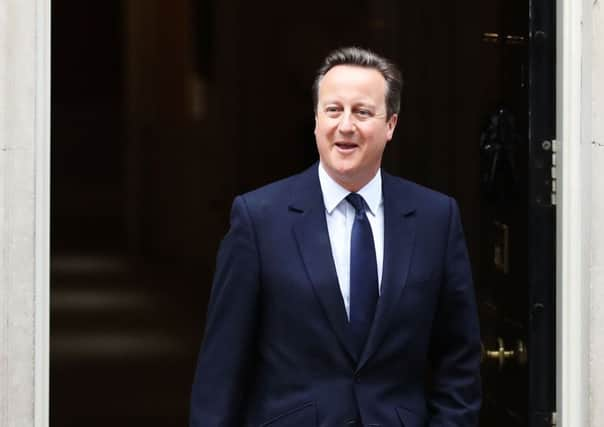Britain '˜ready to confront' economic storm post-Brexit vote


Billions of pounds were wiped off the value of leading firms on the FTSE 100 and the pound plunged to a 31-year low, prompting a stark recession warning, despite efforts by Chancellor George Osborne yesterday to reassure markets.
The Prime Minister told MPs that the government has a “fundamental responsibility to bring our country together” in the aftermath of the EU referendum.
Advertisement
Hide AdAdvertisement
Hide AdLabour leader Jeremy Corbyn is facing a vote of no confidence in his embattled leadership after 20 resignations from his shadow cabinet team.
In Scotland, Nicola Sturgeon will today address MPs at Holyrood where she will seek a mandate to negotiate with EU leaders about a deal to retain Scotland’s place in the bloc.
There are also fears over growing incidents of hate crimes in the UK against foreign nationals in the aftermath of last week’s vote with Mr Cameron insisting this must be “stamped out”.
He will meet European Council leaders in Brussels today and warn that the UK will not be rushed into Brexit negotiations.
Tory grandees have also accelerated the timetable for the selection of a new prime minister amid growing concerns about the prospect of a “zombie government” in the months ahead. A new leader will be elected by 2 September, a month earlier than Mr Cameron had earmarked.
He addressed MPs in the Commons yesterday for the first time since quitting as prime minister following the Brexit vote last week. It came as the value of the UK’s biggest firms continued to plummet with the FTSE 100 closing down a massive 2.55 per cent and RBS down by 15 per cent.
Investment bank Credit Suisse is now warning of a recession next year amid growing uncertainty over the impact of the Brexit vote. Mr Cameron insisted “immediate steps” were being taken to secure the UK economy as the pound continued to plummet and amid reports of investment drying up.
“It’s clear that markers are volatile, there are some companies considering their investments and we know this is going to be far from plain sailing,” he said.
Advertisement
Hide AdAdvertisement
Hide Ad“However, we should take confidence from the fact that Britain is ready to confront what the future holds for us from a position of strength. As a result of our long-term plan we have one of the strongest major advanced economies in the world.
“We are well placed to face the challenges ahead. We have low, stable inflation, the employment remains the highest it’s ever been. The budget deficit is down from 11 per cent of national income forecast to be below 3 per cent this year.
“The markets may not have been expecting the referendum result, but as the Chancellor set out this morning the Treasury, the Bank of England and our other financial authorities have spent the last few months putting in place robust contingency plans.
“The banks’ stress tests have shown that UK institutions have enough capital and liquidity reserves to withstand a scenario more severe than the country currently faces.”
Earlier, Boris Johnson, the lead Leave campaigner and frontrunner to replace Mr Cameron as Prime Minister, sought to reassure EU nationals living in the UK that their status would not be affected.
“It is absolutely clear that people from other European countries who are living here have their rights protected,” he said.
“All that people want to see is a system that is fair, impartial and humane to all people who come here from around the world. People from the UK living in the rest of the EU will also have their rights completely protected.”
Ahead of today’s European Council meeting in Brussels, Mr Cameron revealed he had spoken to German chancellor Angela Merkel, president Francois Hollande of France and a number of other European leaders.
Advertisement
Hide AdAdvertisement
Hide AdHe said: “We’ve discussed the need to prepare for the negotiations and particularly the fact that the British Government will not be triggering Article 50 at this stage. Before we do that we need to determine the kind of relationship that we want with the EU. That is rightly something for the next prime minister to decide.”
He added: “This is our sovereign decision and it will be for Britain and Britain alone to take. Britain is leaving the European Union but we must not turn our back on Europe or on the rest of the world.”